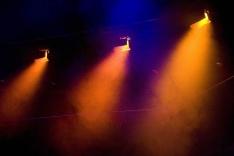Employers and Universities: Work with us?

60 Second Interview: Theatre Electrician
Whilst you are sitting in a theatre, watching a performance on stage, there are a host of people behind the scenes making sure that the sets, props, costumes, lighting, sound and visual effects are all happening in the right place and on cue.
There are a huge range of backstage jobs to explore that draw on creative, construction and craft skills - from building sets to designing costumes and managing the technical aspects of a performance, such as lighting.
A theatre electrician works to bring a lighting designer’s plans to life. They help to rig, set up, programme and repair lighting to create the right effects, as well as operate lights during a performance.
Electricians are needed in theatres, concert and conference venues as well as on tour with theatre groups and bands. They can work with all kinds of lights including strobing, lasers and special effects. Many choose to specialize in theatre, film & TV or live events.
We spoke to Daniel Richardson, who works as an assistant electrician on the Warhorse UK theatre tour, to find out how an interest in drama at school led him to his career.

Name: Daniel Richardson
Company: National Theatre (Freelance)
Industry: Theatre
What is your job? Assistant electrician on Warhorse UK tour
How long have you been doing this job? I started on this show in July 2013
University: Mountview Academy of Theatre Arts
Degree Subject: BA Hons in Technical Theatre
Other qualifications: First Diploma in Performing Arts, BTEC National Diploma in Performing Arts
Interests: Theatre & Football
What was your very first job?
My first professional electrician job was as an assistant electrician on the Sound of Music UK tour aged 22. But I worked in local theatres at home whilst I was training from the age of 15.
What did you want to do when you were at school?
I wasn’t totally sure what I wanted to do, but I knew that I wanted to work in theatre!
What made you want to do your current job?
I have had a passion for theatre since school. When I explored all the career options open to me, I was most interested in the technical, and particularly the lighting roles.
How did you get there?
When I was at secondary school, I was a member of various amateur dramatics groups in my local area. After trying out different roles, I realized that I enjoyed working behind the scenes more than being on stage.
I started working in various local theatres as a stagehand & follow spot operator (operating a moving spotlight) to gain some experience.
After GCSE’s, I took a year out to work and save money. During this time I went to see a careers advisor, who pointed me towards the BTEC and Diploma Course, which I then studied at college for three years. I thought about training as a general electrician after that (which is one option if you want to work in stage lighting), but as I already knew that I wanted to work in the theatre I went to university to study technical theatre, moving straight into a theatrical job at the end of it.
What is a typical day at work like?
When it’s a show day, my work begins three and a half hours before the curtain goes up. We set up and run through checks, including making sure that the lighting rig and all the individual lights are working, which can take up to an hour. There are three of us in the team and when the show is running, we each cover a plot, or space, on the stage. One of us will manage the lighting control desk working the lighting rig, one will be backstage taking stage cues (including releasing lots of smoke, which we use throughout the show on War Horse). The other member of the team will fix any broken kit or be on standby if anything goes wrong.
What’s the best thing about your job?
Working on big shows that I enjoy watching and fixing the different problems that crop up over time. I also enjoy getting to travel around the country on tour seeing different cities and getting paid to do so!
What is the most challenging thing about your job?
Getting to grips with the mechanics of all the different types of moving lights and dimmers being used. Being away from home and family can be tough too.
What advice do you have for people who want to do what you do?
You need to be an outgoing person who doesn't mind working unsociable hours (theatre shows tend to finish late), living away from home and traveling a lot. Practically, you should look for backstage work experience in theatres and learn from the professionals around you. Studying at drama school will definitely set you on the right path but you don’t need a degree to do the job. Gaining lots of electrical knowledge and experience working backstage is what’s key.
Where would you like to be in 5 years?
I would like to be a chief electrician on a touring show or in a receiving house venue (a type of theatre that receives touring companies rather than staging its own shows).
Photo by Dan Brady CC Attribution
For more industry careers advice, check out the Career Zone on our website.
